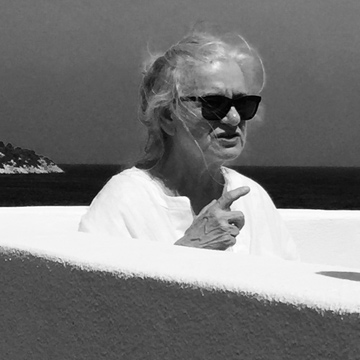
15/05/2018
How to preserve the heart of society?
The heart of society beats to criticalities
Borka Pavićević
founder of the Centre for cultural decontamination
The heart of society beats to criticalities
Dear Suzana,
You ask me: ‘How can we preserve the heart of the society?’ ‘The heart’, which would mean both sense and sensibility in the same place, the beating heart, and ‘preserve’, as you have stated, already reveals or ‘makes uncommon’ the condition in which ‘the heart should be preserved’. When someone tells you ‘take care’, such words are an expression of decency and attentiveness, as well as care. We don’t always say ‘take care’, but rather when there is an insight into a possible danger, of which the final one is the one which cannot be even pronounced. But it intensely exists somewhere; otherwise you would not be warned to ‘take care’.
So, your question, Suzana, refers to concern, more precisely, as it seems to me, as one would say ‘with a great direction’, or in relation to reality, to the anomie of society, to silence, to withdrawal, caused by fear, threat and uncertainty.
What is astounding and absurd, and therefore often unanswered, is that the elites presently ruling the world, as well as autocracies as distorted principles of democracy, as its betrayal, have lost the competence of representing the population, people, and have begun to act against their own children. For where they will live, in the increasing difference between the rich and the poor, and on the planet Earth that is daily and radically destroyed, despite the certainty of self-destruction if this situation continues. Force and power act against justice, balance, ethics and ultimately aesthetics. The ugliness surrounding us is the product of immorality. And environmental pollution is the product of corruption and exploitation of everything existing.
Therefore, the heart of the society relies on dialectics, on outlet and inlet, on blood and oxygen, on two forces, on counterpoint and alignment of tendencies. Sociability exists where there is a dialogue, conflict of thought, the fissure opens up and gathers together the sociability. The requirement for sociability is agon, discussion, conflict of thoughts and arguments. There is hardly any sociability without work, movement, daily opening of the social and public space. And nowadays, everything is done in an adverse manner. Efforts are put in abolishing every public space on behalf of particular and usurping interests, both in terms of place of action, public space, and in political terms, politics as human noble activity. Green areas are exterminated just as freedom of media and freedom of thought, and it is the propaganda which dominates. Criticism has been expelled from schools, it is banished from culture. Authors are suppressed as forcefully as possible in any sense. Privacy is being replaced by personality and personal attitude. What is visible becomes invisible, and what is non-existent becomes a dictate over reality.
The heart of sociability beats to criticalities, and the history of liberty is a history of resistance. (Woodrow Wilson). Sociability resides in resistance.
Dear Suzana, let us now leave the metaphors or symbolism, with a reason in your question. In this time of ours in which symbols are renamed, absorbed in order to be reprocessed, and then expressed as a farce or kitsch, we are looking for a new language that can name the alienated reality for the time being, or a language that can make a breakthrough from lies and illusions to reality.
Hardly can we achieve sociability without community of memories and insight into the legacy of the criminal activity throughout the nineties, without any talk of responsibility. I mean confrontation, while simultaneously looking for a word that has not ‘lost its innocence; (Sartre). Because without such confrontation, we go further into the revision of the past, making impossible what people seek and demand most of all, and that is the certainty of the future.
The healthy heart betas, the sick heart pounds unhappily while struggling to pump well.
We see all around us that those who are asking what is going on are ruling as if everything was all right. However, something is missing, incidents occur which are not incidents of violence that has rather become a rule due to the lack of speech about crime and violence resulting from the legalization of a major, followed by every ‘minor crime’ and every ‘minor violence’.
What is the context in which a young man lives who considers it normal to cut a tree with an axe on Košutnjak during the May Day holidays, and where did he grow up? Let's start from the beginning, from the early morning, what kind of resistance do the citizens demonstrate from the ‘smallest’ events and things to the presence in criminal acts of all kinds without any protest, from illegal construction, usurped parking, all types of pollution, in the country in which towns have no water, while renaming the city of Zrenjanin has been discussed? From one paradox to another and from one blasphemy to another.
In a certain way, sociability dies out in favour of individual lives (apathy and egoism) whose self-realization, again, is hardly possible without sociability.
Therefore, the ‘heart of sociability’ can be preserved only by supporting those who give resistance.
Borka Pavićević is the founder and Director of the Centre for Cultural Decontamination, Veljković Pavilion in Belgrade. She was a 1971 graduate and a 1976 master-degree holder from Belgrade’s Academy of Theatre, Film, Radio and Television. She received the Otto Rene Castillo Award for Political Theater, New York (2000); Hiroshima Foundation Prize for Peace and Culture (2004); Osvajanje slobode (‘Winning Freedom’) Award presented by Maja Maršićević Tasić Foundation to the woman ‘whose actions acknowledge the principles of human rights, the rule of law, democracy and tolerance’ (2005); Routes Award by European Cultural Foundation (ECF), Amsterdam (2009/2010); Legion d’Honneur Award (2001) presented by the Government of the Republic of France.
Borka Pavićević passed away in Belgrade in 2019.
We were honored to have had the opportunity to cooperate with Borka Pavicevic and share the vision of a better and fairer world.

AUTHOR
Borka Pavićević
founder of the Centre for cultural decontamination